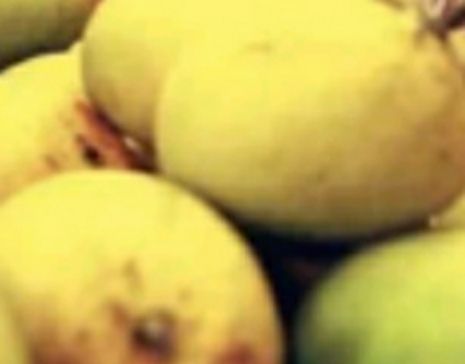Wellnesszone: Carbide-ripened Fruits Are Carcinogenic
Wellnesszone: Carbide-ripened Fruits are Carcinogenic
Fruits are rich in nutrients that promote the wellbeing of humans. They are needed for proper growth and development. Due to greed, some individuals have resorted to ripening fruits with toxic chemicals. These substances are hazardous and threaten human health.
Naturally, fruits produce ethylene (a hormone) that induces the ripening process. Mature fruits such as bananas are picked unripe to avoid spoiling and shipped across the globe to satisfy the demand for them. Then, ethylene is used to ripen the fruits artificially. Since this gas is not harmful, these fruits are safe for consumption. They are so similar to naturally ripened fruits when they ripen. The only safety concern in this process is the presence of trace contaminants, which is not linked to the use of the gas.
 Naturally ripened bananas
Naturally ripened bananas
Recently, artificial ripening of fruits has become questionable in many countries. Mischievous farmers and traders have made the consumption of artificially ripened fruits unsafe. These greedy individuals prefer making more profit to human lives. They use calcium carbide, a substance used for welding purposes to ripen fruits. This compound is toxic and can lead to life-threatening health conditions such as cancer.
 Carbide-ripened bananas
Carbide-ripened bananas
Calcium carbide reacts vigorously with water to produce acetylene, a highly flammable gas. Just like ethylene, acetylene also has a ripening effect on fruits. This organic compound is not harmful. However, calcium carbide also contains traces of arsenic, which is dangerous to humans. Packets of this harmful substance placed in containers of unripe fruits react with water or moisture to produce acetylene.
 Carbide-ripened mangoes
Carbide-ripened mangoes
Calcium carbide is the raw material for the production of calcium cyanamide, a component of fertilizers. This chemical compound is also used for welding. Its use in the artificial ripening of fruits such as apples, bananas, mangoes, and oranges is harmful. Consumption of such fruits can cause allergies, cancer, organ (heart, liver, and kidney) failure, diarrhea, mouth ulcers, and skin rashes.
Besides illnesses, free radicals from this toxic compound can hasten the ageing process. Carbide-ripened fruits can also cause developmental abnormalities or even miscarriages if consumed by pregnant women.
Identification of carbide-ripened fruits
- Artificially ripened fruits do not have uniform color. Patches of green will still be on their skin, especially near the stalks. Contrarily, naturally ripened fruits have black or brown spots on their skins.
- The flesh of these fruits may not be fully ripe despite the ripened skin color.
- Traces of powdery substances can be found on the fruits.
- Their skins can peel off quickly.
- Carbide-ripened fruits are less juicy compared to the naturally ripened ones. Also, they may not have the natural aroma associated with ripe fruits.
- Fruits that are harvested prematurely float on water while mature and naturally ripened fruits sink.
Precautionary measures
The following tips will help you to avoid health problems resulting from consumption of carbide-ripened fruits.
- Buy fruits directly from the growers. Keep mature but unripe fruits in contact with a ripe fruit and at room temperature to hasten the ripening process.
- Wash fruits you bought from the market thoroughly before consumption. Avoid eating the skin of the fruits.
Despite the prohibition of the use of toxic chemicals on food, carbide-ripened fruits still find their way into markets. Enforcement of the regulations and prosecution of perpetrators will help curb this threat to human health.